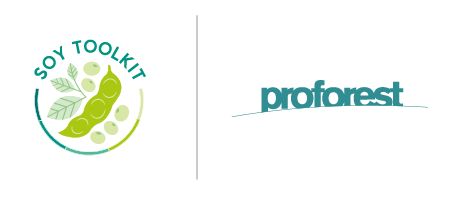What are the business benefits of sustainable sourcing of soy?
From minimising reputational risk to keeping pace with competitors, end-users such as retailers and food manufacturers can benefit from sourcing responsible soy. In this blog we explore the business benefits of improved sustainable soy practices. From here, sustainability and sourcing teams can develop a business case that will resonate with decision-makers.
WHY SUSTAINABLE SOY MATTERS
Soy has undergone the greatest expansion of any global crop, and there is concern that parts of its production are linked with deforestation, human rights abuses and the destruction of unique landscapes.
To decouple soy production from environmental and social damage, stakeholders from across the supply chain need to work towards implementing a responsible sourcing framework for soy. This approach will not only help protect valuable ecosystem services and biodiversity, but also benefit the business.
The business benefits of sustainable sourcing
Here’s how a business can benefit from sustainable soy sourcing:
Minimise reputational risk.
Keep pace with soybean competitors.
Engage soy suppliers.
Maintain and build investor interest.
1. Minimise reputational risk
Soy supply chains can be complex, but responsible sourcing demonstrates a commitment to sustainability.
In the Soy Toolkit, we recommend companies start by undertaking a risk analysis to identify non-compliance with commitments, or negative impacts of commodity production, which can range from land use rights issues to gender inequality. Based on these results, companies can prioritise suppliers and/or sourcing areas for engagement since high risk areas may have the biggest potential for a positive change.
Insight on how to undertake risk analysis can be found by downloading Soy risk analysis: Prioritisation for positive engagement.
2. KEEP PACE WITH COMPETITORS
With increasing concerns and news about negative environmental and social impacts related to soy production and expansion, many leading brands, retailers and food manufacturing companies have begun to implement responsible soy sourcing policies.
Don’t get left behind. Use the key steps, tools and approaches identified in the Soy Toolkit as a first step toward eradicating deforestation from soy supply chains.
Find out more about soy sourcing commitments, monitoring and reporting progress, in element 5 of the Soy Toolkit.
3. ENGAGE SUPPLIERS
Companies with responsible sourcing commitments want to be able to demonstrate that the soy, or soybean-based products, they buy are produced responsibly.
This requires companies buying soy, soy products or products from animals using soy as feed to reach out to their suppliers and invest resources in improving production practices.
Good practices to engage soy suppliers include awareness raising and training; establishing a purchase control system and working towards legal compliance to name a few.
A framework for supplier engagement can be found in Briefing Note 3: Engaging Suppliers on the Soy Toolkit.
4. Maintain and build investor interest
Investment organisations have the potential to drive transformation of the soy industry by encouraging the companies they invest in to adopt and implement responsible policies.
With increasing expectation from investment organisations for companies to source commodities, including palm oil and soy, sustainably, those not conforming to responsible practises will find it increasingly difficult to access markets and capital.
Please see the Soy Toolkit brief prepared to help investors understand, identify and address Brazilian soy-related deforestation risks in their portfolios.
NEXT STEPS
Interested to get started on your responsible soy sourcing journey?
Visit the Soy Toolkit, a free resource hub which simplifies the wide array of existing tools by combining the most relevant ones into a practical framework.
Following the five elements of the Soy Toolkit, we offer free training for companies who need help implementing their responsible soy sourcing commitments.
Please get in touch to speak with our team.



